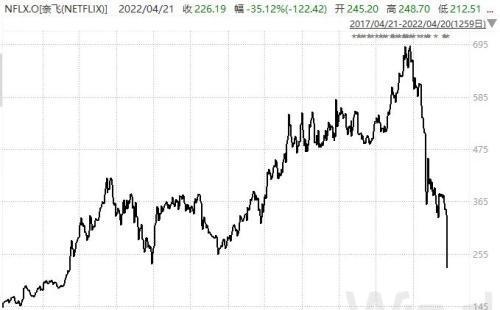Source: Wind News
The fact that fierce competition in the streaming industry is hitting Netflix is already in front of us, and similarly, as the electric car track becomes more crowded, analysts point out that Tesla bulls should also seriously consider this impact.
Netflix this week reported a decline in the number of first-time subscribers in more than a decade and expects further declines in the future. Far below the company's own and Wall Street's forecasts, its stock price has plunged its stock price into a quagmire.
Netflix said after hours on Tuesday that it lost 200,000 subscribers in the first quarter, its first loss of subscribers since 2011. The company had expected a 2.5 million subscriber growth in the first quarter. Netflix also predicted that it would lose another 2 million users in the second quarter, making it its worst year since its listing.
As peacock, Paramount+, Disney+, Hulu, Amazon Prime and many other streaming platforms have entered the market to seize shares, Netflix's growth pace has been slowed. Growth inflection points are often painful for growth stocks.

(Image from Wind Financial Terminal)
After hitting more than a quarter of its post-market plunge on Tuesday, Netflix shares fell another 35 percent on Wednesday and have fallen more than 62 percent so far this year, down 68 percent from its 52-week high in November. In an instant, Netflix's market value evaporated by about $200 billion, and its market value fell below $100 billion at one point, far from the peak level of more than $300 billion.
So, for Tesla investors, who are the "Disney+s" in the electric vehicle industry? Many car companies are eager to try.
Traditional car giants such as Ford, General Motors, and Volkswagen are all vying for Tesla's dominance in the U.S. electric vehicle market, and with the addition of luxury car manufacturers such as Audi and Porsche, as well as the rise of local electric vehicle startups, Tesla's market share may be more squeezed.
Tesla's market share in Europe and China is much smaller, either because there are more electric models available for sale in those regions and because Tesla currently has limited capacity — a Model Y, for example, could take nine months to deliver.
According to Barron's, the latest industry data shows that Tesla sold about 16,000 vehicles in the EU in February, accounting for 18% of the EU's overall electric vehicle sales. According to industry data written by Citi analyst Jeff Chung, Tesla's sales in China account for about 15%, while China's electric vehicle penetration rate is about twice that of the European Union.
Wedbush analyst Dan Ives said more competition is coming, though he's not so worried at the moment. Ives pointed out that Tesla currently has several times the number of car manufacturing assemblies than other car companies.
Tesla's performance on Wednesday outperformed market expectations, with price increases helping it successfully cope with supply chain disruptions and rising costs. Founder and CEO Musk said on a conference call that Tesla is on track to achieve 60 percent car delivery growth this year and remains confident of seeing 50 percent annual delivery growth in a few years.
Other car companies are struggling to catch up with Tesla. Ford and GM plan to sell millions of electric vehicles a year by the mid-decade. The two companies combined to sell about 52,000 units in North America last year. Volkswagen is also ambitious, with the company selling about 10 electric vehicles worldwide in the first quarter. Tesla's total sales are 310,000 units.
Pedro Palandrani, head of research at Global X ETF, said: "Ultimately... The original equipment manufacturer (OEM) market is a zero-sum game. ”
As the share of electric vehicles in new car sales slows, all companies will have to join the battle for market share. When sales growth slows, changes in market share may affect the company's stock price movements.
At the beginning of 2021, Netflix's price-to-earnings ratio based on its 2021 earnings forecast was about 42 times, while the current price-to-earnings ratio based on its 2022 earnings forecast was about 20 times. Analysts now expect Netflix's earnings this year to be down about 2 percent from last year.
(Image from Wind Financial Terminal)
Looking at Tesla, its expected price-earnings ratio at the beginning of last year was about 123 times. For the full year 2021, the company's vehicle deliveries increased by about 87% compared to the previous year. This year, analysts expect Tesla deliveries to grow by 50%-60%, and the current price-to-earnings ratio based on 2022 earnings forecasts is about 96 times. Current expectations for Tesla mean its earnings are expected to grow by about 60 percent this year.
Palandrani noted that not every car company will be a winner, which is why he holds a basket of auto stocks, including Tesla, Toyota, Ford and General Motors, and he believes the industry's outlook is bright, thanks in part to electric vehicles. Other investors may consider this as a hedge against a risk of falling shares like Netflix's stock price.